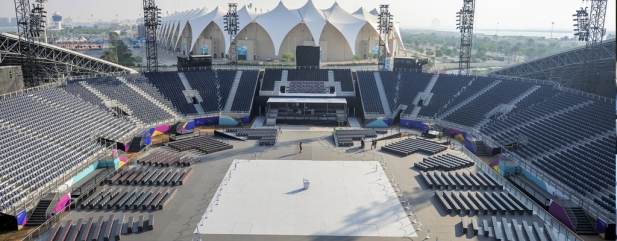Archived article
Please note that tax, investment, pension and ISA rules can change and the information and any views contained in this article may now be inaccurate.
Arena Events has the hallmarks of a great small cap investment

We’ve spotted a very interesting company which has quietly got on with the job since joining the stock market last summer.
Arena Events (ARE:AIM) boasts high levels of recurring revenue (70%), it trades on an reasonable valuation and has clear potential to lift margins. It also has zero or negative working capital as many projects pay a significant sum upfront.
We believe Arena could be a good investment for anyone who is happy to buy into a company delivering a slow but steady increase in revenue and profit, supported by a circa 3% dividend yield.
WHAT DOES ARENA DO?
The £69m business provides equipment to run major sports events and shows. Its structures and seating are used in such prestigious events as Wimbledon (tennis), the US PGA (golf), Cheltenham (horse racing) and the Chelsea Flower Show.
The UK accounted for 43% of revenue by geography in 2016; the US accounted for 40% and the remaining 17% came from the Middle East and Asia.
EBITDA (earnings before interest, tax, depreciation and amortisation) margins are higher in the UK due to Arena providing additional services such as furniture and crockery hire. It wants to offer this broader suite of services in the US as that territory is currently dominated by the provision of structures (94% of revenue versus 56% in the UK).
To achieve this goal, chief executive Greg Lawless wants to make acquisitions to increase the company’s presence in the US where it currently has a mere 1% market share.
First, a deal or two could help provide the capacity to offer non-structure services in the US and hopefully push up profit margins. Second, Lawless wants Arena to have a presence on the US west coast which is considered to be the largest rental market in the world. That could also help it to service national customers across North America on a more economic basis.
We’re told there is a ‘significant pipeline’ of potential acquisitions. The more immediate prospects are bolt-on deals. Chief financial officer Piers Wilson says a larger deal would most likely require the company to ask shareholders for more cash. ‘Our major shareholders
at the time of the IPO indicated that they are keen to support us with additional equity when required,’ he adds.
Arena recently bought specialist furniture hire business GDL Productions which provides furniture to concerts, music festivals, fashion shows, sporting and corporate hospitality events across the UK.
OVERSEAS OPPORTUNITIES
The Middle East and Asia could see continued growth in the number of large international sporting events, as well as live music and cultural events, according to Arena.
For example, last year it won a two-year contract for the provision of structures and services for the inaugural CJ golf trophy in South Korea. This is a new tournament on the US PGA Tour.
Its Middle Eastern operations should benefit from early stages of construction work for the 2020 World Expo to be held in Dubai. Stockbroker Cenkos believes this event will have a ‘particularly strong benefit’ to Arena’s 2019 earnings.
Although such large activities can provide a nice boost to earnings, Arena has tried to reduce its reliance on one-off events. It has also tried to smooth out its earnings across the year, as illustrated by the recent growth in the provision of temporary ice rinks.
‘We’re now busy nearly all-year round. Ice rinks and exhibitions have helped to reduce seasonality in the business,’ says Lawless.
LOSS-MAKING PAST
Pre-IPO Arena generated operating profit in the region of £1.15m for both 2015 and 2016, yet this was pale in comparison to the £2.7m (2015) to £3.6m (2016) of finance costs, meaning the business was loss making. That situation has now changed.
‘We were owned by private equity before floating; they are now completely out. We had high yield loan notes which have now been repaid along with some bank debt,’ says Wilson.
Arena recently guided for an £11.5m net debt position at the end of 2017. ‘Net debt is now less than 1 times EBITDA,’ adds Wilson. ‘Our plan is to never go beyond 2 times EBITDA.’
In the UK, Cenkos says individual project margins are typically 30% to 40% (on a gross basis) for structures; and 25% over a full year. For seating work, individual project margins are typically more than 40%; and c35% over a full year. Interiors command 40% to 45% margins; and it’s around 30% for ice rinks. Cenkos notes that ice rinks come with very few overheads and so command high EBITDA margins.
Nearly a third (30%) of EBITDA is reinvested into maintenance capital expenditure each year, says Wilson. All of Arena’s products are reusable and transportation is outsourced to third parties.
Cenkos forecasts the company will announce £4.5m pre-tax profit for 2017 when results are published in April 2018. It reckons that figure will rise to £5.9m in 2018 and £7.2m in 2019.
Important information:
These articles are provided by Shares magazine which is published by AJ Bell Media, a part of AJ Bell. Shares is not written by AJ Bell.
Shares is provided for your general information and use and is not a personal recommendation to invest. It is not intended to be relied upon by you in making or not making any investment decisions. The investments referred to in these articles will not be suitable for all investors. If in doubt please seek appropriate independent financial advice.
Investors acting on the information in these articles do so at their own risk and AJ Bell Media and its staff do not accept liability for losses suffered by investors as a result of their investment decisions.
Issue contents
Big News
- Why interest rates on deposit accounts could be set to rise
- Get ready for major changes to the FTSE 100 and FTSE 250 at next week’s reshuffle
- Crunch time as Tesco’s acquisition of Booker goes to shareholder vote
- Four important stories from the past week: HSBC, BHP Billiton, Acacia Mining and Fidessa
- Can airlines avoid a repeat of the recent ticket price war?

 magazine
magazine









